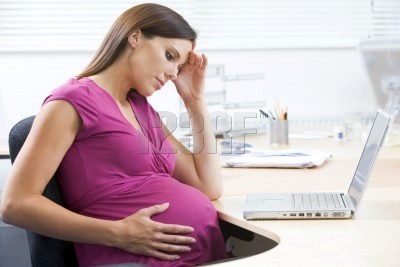Health-care professionals must be aware of rarer causes of headaches in pregnancy
Most headaches in pregnancy and the postnatal period are benign, but healthcare professionals must be alert to the rarer and more severe causes of headaches, suggests a new review published today (23 May) in The Obstetrician & Gynaecologist (TOG).
The review looks at common causes for headaches during pregnancy and the postnatal period, possible conditions that may be associated with headaches and how healthcare professionals should manage the care of the woman appropriately.
There are 85 different types of headache. Approximately 90% of headaches in pregnancy are migraine or tension-type headaches. However, pregnancy can lead to an increased risk of certain secondary headaches, a headache caused by an underlying health condition, states the review.
The review states that most headaches in pregnancy are benign but in some cases can be more serious. According to the Confidential Enquiries into Maternal Deaths in the United Kingdom 2006 – 2008 report, neurological conditions were the third most common cause of death, considering both direct and indirect causes. The authors of the review therefore emphasise the need for all medical staff to be well trained to take a full history and examination, make a provisional differential diagnosis and know when to seek neurological expertise.
Migraine is a common form of headache; the condition is more common in women, with the highest prevalence rates during the childbearing years. The review states that pregnancy leads to a reduction in the frequency and severity of attacks of migraines without aura, also known as a common migraine. However, women who do experience migraines have a more than two-fold increased risk of pre-eclampsia than those who do not. Women therefore need to be aware to consult a healthcare professional if their headache is different from their usual migraine, highlights the review.
Another condition associated with a headache in pregnancy is idiopathic intracranial hypertension, a build up of high pressure inside the skull, a rare condition but more prevalent in obese women of childbearing age. The condition may present for the first time in pregnancy and pre-existing disease tends to worsen in pregnancy. It can be fatal if it is not treated promptly as a medical emergency.
I’m pregnant and I’m having terrible headaches. Is this normal?
It’s not unusual to get headaches when you’re pregnant, especially in the first trimester. And if you’ve always been susceptible to headaches, pregnancy can make them worse.
We don’t know exactly why being pregnant makes your head ache. It’s probably due to the hormonal free-for-all your body is undergoing, and changes in the way your blood circulates.
Your headaches may always appear on a certain area of your head, or you may get them in different places. They may cause a sharp throbbing pain, or a dull general ache. Headaches don’t cause other symptoms.
Migraine headaches are different. A migraine is a type of headache thought to be caused by abnormal function in the brain’s blood vessels. They can give you a headache and make you feel nauseous and sensitive to light, sounds and smells.
If you’re prone to migraines, you may find you suffer less in pregnancy, particularly if the migraines were connected to your menstrual cycle.
Unfortunately, migraines usually return to their pre-pregnancy pattern once your baby is born.
 Pregnancy is also a recognised risk factor for cerebral venous thrombosis (CVT), the presence of a blood clot in the dural venous sinuses, which drain blood from the brain. Caesarean section, systematic infection, vomiting and anaemia increase the risk and headache is the most frequently (80 – 90%) occurring symptom in CVT and often the first symptom reported by patients.
Pregnancy is also a recognised risk factor for cerebral venous thrombosis (CVT), the presence of a blood clot in the dural venous sinuses, which drain blood from the brain. Caesarean section, systematic infection, vomiting and anaemia increase the risk and headache is the most frequently (80 – 90%) occurring symptom in CVT and often the first symptom reported by patients.
The review also discusses imaging and advises that imaging of the brain should never be withheld because a woman is pregnant and women should be reassured that imaging is safe.
Kirsty Revell, Specialist Registrar, Obstetrics and Gynaecology at the Princess Anne Hospital, Southampton and co-author of the review said:
“Headaches are common in life and in pregnancy. Most headaches are benign, for example migraine or tension headaches, but some headache types can be more serious and an indication that something is seriously wrong.
Experiencing headaches during pregnancy is one of the most common discomforts and complaints. Headaches may occur at any time during your pregnancy, but they tend to be most common during the first and third trimesters.
What causes headaches during pregnancy?
An increase in headaches during the first trimester is believed to be caused by the surge of hormones along with an increase in the blood volume circulating throughout your body. These headaches may be further aggravated by stress, poor posture or changes in your vision.
Other causes of headaches during pregnancy may involve one or more of the following:
Lack of sleep
Low blood sugar
Dehydration
Caffeine withdrawal
Stress (too many changes)
“It is vital that both GPs and obstetricians are aware of the signs and symptoms associated with these conditions and know when to seek advice from a specialist.”
Jason Waugh, TOG Editor-in-chief added:
“Many women experience headaches during pregnancy and the postpartum period and most are managed by women themselves or within primary care.
 “Women presenting with headaches in pregnancy and the postnatal period may be at home, on a maternity ward, in an antenatal clinic, at a tertiary referral centre or in an emergency department. All medical staff should be aware of the symptoms, signs and appropriate response to the rarer and more severe causes of headaches that continue to cause avoidable morbidity and mortality.”
“Women presenting with headaches in pregnancy and the postnatal period may be at home, on a maternity ward, in an antenatal clinic, at a tertiary referral centre or in an emergency department. All medical staff should be aware of the symptoms, signs and appropriate response to the rarer and more severe causes of headaches that continue to cause avoidable morbidity and mortality.”
You may want to try to relieve your headache with one or more of the following natural remedies:
If you have a sinus headache, apply a warm compress around your eyes and nose
If you have a tension headache, apply a cold compress or ice pack at the base of your neck
Maintain your blood sugar by eating smaller, more frequent meals. This may also help prevent future headaches
Get a massage. Massaging your shoulders and neck is an effective way to relieve pain
Rest in a dark room and practice deep breathing
Take a warm shower or bath
Applying heat or cold to the sides of the head, the eyes, or along the back of the neck is one of the best ways to reduce or relieve the pain associated with a headache. Heating pads and cold packs come in a variety of shapes and sizes, but most require using a microwave or the freezer first. Another draw back with some of these is that the heat or cold subsides as time goes on.
###
Nicole Weingartner
.(JavaScript must be enabled to view this email address)
201-748-5808
Wiley